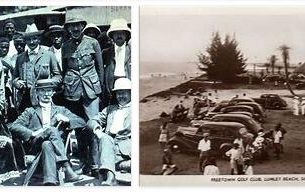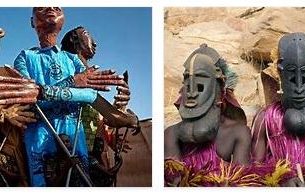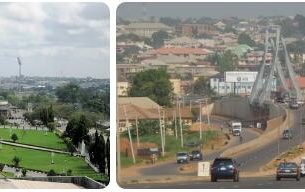Liberia – The first independent country in Black Africa
Liberia is the first country in Africa to have a democratically elected president, Ellen Johnson-Sirleaf, from January 16, 2006 to January 22, 2018. This is all the more remarkable since Ellen Johnson-Sirleaf was able to prevail against ex-soccer star George Weah in 2005. High hopes were placed in her. A 14-year civil war had almost completely destroyed the country’s infrastructure. In addition, around 100,000 civil war fighters had to be integrated into society. In 2011 she received the Nobel Peace Prize.
The history of Liberia begins with the return of freed slaves by the American Colonization Society. The United States of America acquired parts of the British colony of Sierra Leone and established settlements for former slaves. In 1847 these settlements were merged to form Liberia, which became the first African state to declare its independence in the same year. The stretch of land on which Liberia arose was already settled before the liberated slaves arrived. This did not prevent the so-called Ameriko-Liberians from usurping political power. A kind of black apartheid quickly developed. It was not until 1907 that the indigenous population got the right to vote.
| Name of the country | Republic of Liberia |
| Form of government | Presidential Republic |
| Geographical location | West Africa |
| National anthem | “All Hail, Liberia, Hail!” |
| Population | about 5 million (Credit: Countryaah: Liberia Population) |
| Ethnicities | 16 ethnic groups, including Kpelle, Bassa, Grebo, Kru, Gio |
| Religions | about 80% Christians, 15% Muslims and numerous animists- also among the members of the Christians and Muslims |
| Languages | English is the official language, African languages |
| Capital | Monrovia |
| Surface | 100,067 km² |
| Highest mountain | Mount Nimba with a height of 1,752 m |
| Longest river | Cavally with a length of 515 km |
| Largest lake | There are no larger lakes in Liberia. |
| International license plate | LB |
| National currency | 1 Liberian dollar = 100 cents |
| Time difference to CET | – 1h |
| International phone code | 00231 |
| Mains voltage, frequency | 110/220 volts and 60 hertz |
| Internet TLD (Top Level Domain) | .lr |
Liberia: history
In the 19th century
In 1821 the American Colonization Society, dedicated to the repatriation of freed slaves, founded the city of Monrovia. The territory previously belonged to the colony of Sierra Leone and had been bought from the British. In the period that followed, several other settlements were founded by former slaves from the USA, which were initially under American governance.
According to Abbreviationfinder website, the merger of these settlements in 1847 created Liberia, which declared its independence in the same year. Joseph J. Roberts, the previous governor, became the country’s first president. In 1862 the USA also recognized Liberia’s sovereignty after the European countries had already done so. The country’s political power remained in the hands of the black immigrants from the United States, at the expense of the indigenous people, who established a kind of apartheid system.
The Berlin conference in 1895 decided to surrender parts of the country to France, thereby defining Liberia’s current borders.
20th century until today
In 1904 the African population received civil rights and in 1907 the right to vote. In 1926 part of the territory was ceded to the US companies Firestone and Goodrich for a period of 99 years for rubber plantations. In 1944 William Vacanarat Shadrach Tubman (1895-1971) was elected President. Around 20 years later, rich deposits of ore and diamonds were discovered in Liberia. The mining, which began shortly thereafter, was operated by US companies. Tubman remained president of the country until 1971. He was succeeded in 1971 by William R. Tolbert.
Corruption and mismanagement led to unrest in the capital Monrovia in 1973/74 and 1979/80. In April 1980, Master Sergeant (Sergeant Major) Samuel Kanyon Doe (1950-1990) took power in a military coup. President Tolbert and members of his government were assassinated, the constitution suspended and a state of emergency declared. Doe established an authoritarian-repressive military regime and copied the previous American-Liberian patronage system. When filling the offices he preferred members of his own ethnic group, the Krahn, as well as the Muslim Mandigo. Other ethnic groups, notably the Gio and Mano in Nimba County, were persecuted with increasing brutality. The opposition parties were not allowed to vote in the October 1985 elections and Doe won with 50.9% of the vote.
In January 1986, Samuel Doe was sworn in as President and Prime Minister. Corruption and nepotism caused the country’s further economic decline in the period that followed.
In December 1989 the civil war began in Liberia. The “National Patriotic Front of Liberia” (NPFL) founded by Charles Taylor attacked the government troops from the Ivory Coast and quickly brought most of the country under control. A takeover of power by Taylor was prevented by the West African community of states ECOWAS under the leadership of the Nigerian armed forces. Doe was murdered in 1990. His supporters formed the United Liberation Movement of Liberia for Democracy (ULIMO) and began the fight against the NPFL. A UN embargo led to food shortages in the country. In a first peace agreement that was concluded in August 1995 in Abuja (Nigeria) at the end of ECOWAS,
Civil war broke out again in April 1996, but in August of the same year another peace agreement was reached in Abuja (Nigeria) are ended again. Ruth Perry became the Chair of the State Council in September, making it the first woman in Africa to be President. The bloody civil war, which lasted eight years, claimed over 200,000 lives and forced around a million refugees (more than a third of the population) to leave their homes. The disarmament and demobilization carried out by ECOMOG showed that 18% of the NPLF consisted of child soldiers. Observers noted that Nigeria had represented its own interests in the conflict through ECOWAS. In addition, some European companies have been accused of having delivered weapons to Liberia in exchange for tropical timber and diamonds.
In July 1997 elections took place in which Charles Taylor won with 75.33% of the vote. The NPP (National Patriotic Party) gained a majority in the House of Representatives. Taylor ruled in an authoritarian, repressive style. According to reports from two Liberian human rights organizations, children were kept as slaves in four parts of Liberia. In 1999 ECOMOG, as well as Great Britain and the USA, accused the government of supporting the rebels in Sierra Leone. At the African conference on child soldiers in April of the same year, Liberia was accused of using child soldiers in Sierra Leone. But all allegations were denied by the Liberian government.
Since the dominant ethnic groups under Doe were largely excluded from power in the new government, clashes between the army and the predominantly Krahn and Mandigo rebel movement LURD (Liberians United for Reconciliation and Democracy) broke out again from 2000. At the beginning of 2002 another rebel movement (MODEL, Movement for Democracy) was formed in Liberia. After unsuccessful mediation efforts by ECOWAS, a peacekeeping force, the ECOWAS Mission in Liberia (ECOMIL), was sent to Monrovia. Charles Taylor went into exile in Nigeria. His office was temporarily taken over by Moses Zeh Blah. In the ensuing peace talks in Accra, Gyude Bryant was appointed Chairman of the National Transitional Government.
The mission of the West African community of states ECOMIL was replaced by the multinational UNMIL by UN resolution in September 2003. The formation of a transitional government lasted until March 2004. In the presidential elections of November 8, 2005, World Bank expert Ellen Johnson-Sirleaf (born 1939) won 57.9% of the votes against ex-soccer star George Weah (born 1966) which has long been considered a favorite. She was inducted into office on January 16, 2006. She is the first woman to have been elected president of an African country.
Charles Taylor is considered one of the most vicious war criminals and human rights violators in Africa. He was extradited from exile in Sierra Leone on June 20, 2006 to the International Criminal Court in The Hague. The trial against him officially opened on July 4, 2007, and he was subsequently sentenced to life imprisonment.



